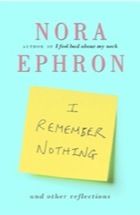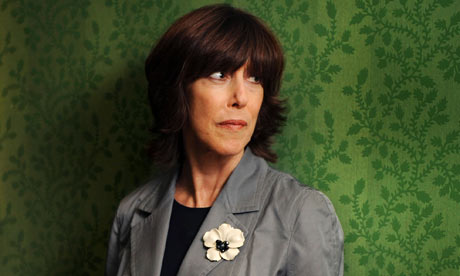An extract from writer and film-maker Nora Ephron's new book I Remember Nothing and Other Reflections, on the heartbreak of seeing your work fail, along with observations on omelette and chicken soup
I have had a lot of flops.
I have had movies that were total flops.
When I say total flops, I mean they got bad reviews and they didn't make
money.
I have also had partial flops: they got good reviews and they didn't make money.
I have also had hits.
It's lovely to have a hit. There's nothing like a hit.
But it's horrible to have a flop. It's painful and mortifying. It's lonely and sad.
A couple of my flops eventually became cult hits, which is your last and final hope for a flop, but most of my flops remained flops.
Flops stay with you in a way that hits never do. They torture you. You toss and turn. You replay. You recast. You recut. You rewrite. You restage. You run through the what-ifs and the if-onlys. You cast about for blame.
 One of the best things about directing movies, as opposed to merely writing them, is that there's no confusion about who's to blame: you are. But before I became a director, when I was just the screenwriter, I could cast blame everywhere. There's a movie I wrote years ago that didn't work. In my opinion. You may have seen this movie. You may even have loved it. But it was a flop when it opened; it got exactly one good review in all of America, and then it sank like a stone.
One of the best things about directing movies, as opposed to merely writing them, is that there's no confusion about who's to blame: you are. But before I became a director, when I was just the screenwriter, I could cast blame everywhere. There's a movie I wrote years ago that didn't work. In my opinion. You may have seen this movie. You may even have loved it. But it was a flop when it opened; it got exactly one good review in all of America, and then it sank like a stone.
For years I tried to figure out where I'd gone wrong and what I should have done. What should I have said to the director? What should I have done in order to fight for the original draft of the script, the best draft, the one with the voiceover?
What could I have done to prevent the director from inserting the fun-house sequence, or from cutting the flashbacks, which were really funny?
Or were they?
I spent years wondering about all this. Then, one day, I had lunch with the movie's editor. I was about to direct my first movie, and I was looking for advice. At a certain point, we got around to the flop. He must have brought it up; I never would have. That's another thing about flops: you never talk about them afterward, they're too painful. But he assured me that nothing could have been done; the problem, he said, was the casting. This calmed me down temporarily. This was at least a solution to the riddle of why the movie hadn't worked – it was miscast. Of course. So it wasn't my fault. What a relief.
Full extract at The Guardian
I have had movies that were total flops.
When I say total flops, I mean they got bad reviews and they didn't make
money.
I have also had partial flops: they got good reviews and they didn't make money.
I have also had hits.
It's lovely to have a hit. There's nothing like a hit.
But it's horrible to have a flop. It's painful and mortifying. It's lonely and sad.
A couple of my flops eventually became cult hits, which is your last and final hope for a flop, but most of my flops remained flops.
Flops stay with you in a way that hits never do. They torture you. You toss and turn. You replay. You recast. You recut. You rewrite. You restage. You run through the what-ifs and the if-onlys. You cast about for blame.
 One of the best things about directing movies, as opposed to merely writing them, is that there's no confusion about who's to blame: you are. But before I became a director, when I was just the screenwriter, I could cast blame everywhere. There's a movie I wrote years ago that didn't work. In my opinion. You may have seen this movie. You may even have loved it. But it was a flop when it opened; it got exactly one good review in all of America, and then it sank like a stone.
One of the best things about directing movies, as opposed to merely writing them, is that there's no confusion about who's to blame: you are. But before I became a director, when I was just the screenwriter, I could cast blame everywhere. There's a movie I wrote years ago that didn't work. In my opinion. You may have seen this movie. You may even have loved it. But it was a flop when it opened; it got exactly one good review in all of America, and then it sank like a stone.For years I tried to figure out where I'd gone wrong and what I should have done. What should I have said to the director? What should I have done in order to fight for the original draft of the script, the best draft, the one with the voiceover?
What could I have done to prevent the director from inserting the fun-house sequence, or from cutting the flashbacks, which were really funny?
Or were they?
I spent years wondering about all this. Then, one day, I had lunch with the movie's editor. I was about to direct my first movie, and I was looking for advice. At a certain point, we got around to the flop. He must have brought it up; I never would have. That's another thing about flops: you never talk about them afterward, they're too painful. But he assured me that nothing could have been done; the problem, he said, was the casting. This calmed me down temporarily. This was at least a solution to the riddle of why the movie hadn't worked – it was miscast. Of course. So it wasn't my fault. What a relief.
Full extract at The Guardian






